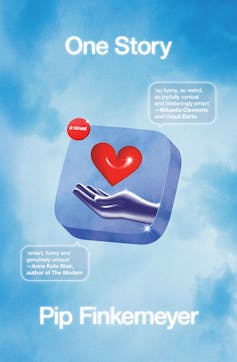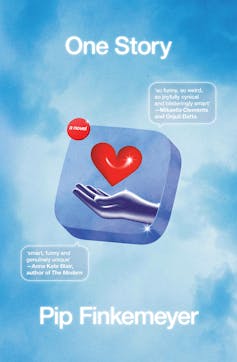When I began reading Elaine Castillo’s Moderation, a new American novel about the psychological damage of online moderation, I had to pause.
I’d read novels that confronted difficult material before, but this one blurred the line between bearing witness and re-enacting pain.
The book follows Girlie, a content moderator for a social media giant whose work requires her to watch and delete the internet’s most violent footage. Castillo threads this labour through a broader story of tech exploitation, immigration and the way empathy becomes a marketable skill.
I put it down, deeply uncomfortable, but also alert to the question: where is the line between necessary confrontation and unnecessary harm?
Review: One Story – Pip Finkemeyer (Ultimo)
That question lingered as I turned to Australian novelist Pip Finkemeyer’s One Story, a novel interested in power and performance that stages its discomfort through satire rather than shock. If Moderation displays to readers the brutality of what’s seen, One Story unsettles by showing us how violence can hide behind language – in self-branding and the performance of care.
Set between Silicon Valley, Bali and the digital ether of online mythmaking, One Story unfolds as a collage of interviews, transcripts, online threads and recollections from those who knew – or thought they knew – its central figure, Dot van Jensen.
Dot is the CEO of the eponymous storytelling platform. One Story is an app that promises to unify global narratives into a single daily story, “a sort of algorithmic scripture capturing the emotional pulse of the world.”
She is also a master manipulator, narcissist, lover and mother: part tech visionary, part public scandal.
Tech’s golden girl
The novel opens, characteristically, in self-mythologising mode.
“I was tech’s golden girl with golden hair,” Dot boasts. “CEO is my blood type.”
In a few pages, she establishes herself as one of Finkemeyer’s most unreliable creations – a woman who, like the platform she builds, believes narrative is both currency and confession.

Her voice is slick with the idioms of self-optimisation: “Efficiency is meaningful,” she tells a lover mid-kiss. “My no-phones policy meant the only way to talk to me was face-to-face, but I didn’t identify as a person who should have to go to meetings.” It is the rhetoric of a person who confuses boundaries with branding.
Finkemeyer’s satire is unrelenting. The early chapters, told in Dot’s own voice, mimic the cadence of corporate keynotes and startup manifestos, but laced with absurd self-awareness. The absurdity works because it is so recognisable.
The slogans sound like motivational copy taken from LinkedIn posts: “We make technology for human bodies;” “We’re not asking for more of your time – we’re asking for less.” But behind the polished aphorisms, there’s something genuinely sinister: the commodification of intimacy.
When One Story is launched, the unveiling feels more like a sermon than a product demo. Dot’s lover and co-founder, Rae, takes the stage in San Francisco to present the device – a handheld heart, glowing with text – declaring:
One story a day. All you need to know of the world, right in the palm of your hand. Then the gift of your life back.
The pitch promises connection but enacts reduction, compressing the world’s chaos into a single paragraph. Finkemeyer’s writing here is sharp and rhythmic, the prose echoing the tech-world fetish for clarity while exposing its moral emptiness.
Desire becomes strategy
Dot’s narcissism could easily have become one-dimensional, but Finkemeyer gives her depth through contradiction. She is a Dutch-born immigrant who once cleaned train station floors in Spain and raised her son, Jon, alone. She’s also a queer woman who weaponises charm and sexuality as forms of dominance.
When she recalls her early relationships – “We had met in the rain at the bus stop […] we were fourteen” – her tenderness is always filtered through the language of transaction. Love becomes labour and desire becomes strategy.
Even her erotic imagination folds back into ambition. “I saw that it was my job to bring the feminine to the tech world,” she claims, “to spread my femme energy all over everyone inside, without them suspecting a thing.” This conflation of seduction and messianic mission underpins the novel’s satire.
Dot treats intimacy as another medium for control. The passages depicting her affair with Rae are especially uncomfortable in their precision. Rae yearns for genuine connection, but Dot instrumentalises her affection.
“I could give her companionship, stewardship, mentorship,” Dot reflects, “even, when she desired it, sexual intimacy. But it would always be fleeting, in the moments between when the real work was being done.”
The bluntness of this confession – half self-awareness, half sociopathy – crystallises the book’s moral core: the idea that emotional labour has been subsumed by the logic of productivity.
The novel’s structure reinforces this unease. Each part shifts perspective, from Dot’s self-narration, to Rae’s testimony in a damning documentary, to Jon’s retrospective reflections and finally to the collective voice of “We/Us,” the employees of One Story.
This multi-voiced design mirrors the saturation of mediated storytelling in the digital age, where every narrative is filtered through another. Finkemeyer uses these shifting forms to test the reliability of voice itself.
Rae’s section, presented as a transcript from the exposé that topples Dot, captures the collapse of authenticity into performance.
“Dot seduces everyone,” Rae says. “She’s a master of seduction … funny weird, but not funny ha-ha.”
Her recollections oscillate between admiration and repulsion, revealing how charisma functions as a form of coercion. When she describes the early prototypes of One Story – jokes fed into an algorithm to generate “content” for the rich – the satire feels painfully plausible.
Finkemeyer understands that what we now call “innovation” often originates in cringe.
The most chilling turn in the book comes when the collective voice of the company takes over. “We were always watching the three of them,” the employees recall, “trying to figure out who loved whom the most.”
Their admiration transforms into complicity. They speak like a Greek chorus, euphoric and self-justifying:
We all subscribed to the idea that the world was becoming a better place. And because we worked at One Story, we were on the right side of history.
Finkemeyer renders this corporate chorus voice with disturbing precision, exposing how ideology seeps into syntax.

Confession as violence
Throughout, the novel plays with the idea that confession itself can be a form of violence. When its Campana Analitica scandal breaks, the company’s PR machine deploys the same placid, tech-bro tone used to describe their mission.
Asked by a documentary producer about the human cost of their data leaks, Rae replies with deadpan sincerity: “We take user privacy seriously and have set up a taskforce …” The irony lands hard because it is so familiar, in its absence of feeling and routinisation of harm.
(Campana Analitica is a thinly veiled parody of the Cambridge Analytica scandal, in which a political consulting firm harvested Facebook user data to manipulate voter behaviour.)
In its final chapters, One Story becomes increasingly self-reflexive, blurring the line between the documentary’s gaze and Dot’s own attempt to narrate herself. As fragments of her story proliferate online, speculation replaces truth. Finkemeyer lets the noise build to an almost comic pitch, showing how, in a world saturated with storytelling, the self can vanish beneath its own narration.
Yet the novel resists pure cynicism. Beneath its biting humour and relentless irony is a sustained enquiry into what it means to live ethically in a culture that monetises empathy.
Dot’s company promises “one story a day” as if emotional attention could be quantified. But the narrative that emerges from the novel’s fragments – Dot’s childhood poverty, her fraught relationship with her son, Rae’s idealism corroded by proximity to power – suggests something more tender. Finkemeyer’s satire never forgets that these performances of self arise from longing for recognition and for control over one’s story.
Finkemeyer’s talent lies in her ability to make narcissism feel both grotesque and magnetic. The novel’s humour – its deadpan send-ups of startup jargon, its parodies of TED-talk sincerity – is so attuned to the rhythms of contemporary speech that it often feels documentary itself. Reading it is like scrolling through a feed that’s equal parts confession and advertisement.
Still, there are moments where the novel’s polish threatens to smooth over its emotional stakes. Finkemeyer’s control is so deft that her irony occasionally blunts the moral force of the work.
The narrative’s self-aware commentary on storytelling as capital can feel overbearing. But perhaps this, too, is deliberate. The exhaustion we feel reading Dot’s voice, the repetition of slogans and spin, mimics the burnout of inhabiting digital life. Finkemeyer doesn’t just represent the attention economy; she recreates its seductions and its fatigue.
One Story is a unique kind of satire: one that is amusing, yet also profoundly sad. Its characters are trapped not by villains but by economic, technological and emotional systems that reward performance over sincerity. Dot, Rae and Jon each mistake narrative for connection. Their tragedy is not that they are monstrous, but that they are ordinary.
As Dot says early on, defending her own myth: “The only thing I’m guilty of is becoming the person they so desperately wanted me to be.”
Finkemeyer brings us to a place of uneasy recognition. The cringe we feel at Dot’s arrogance, at Rae’s complicity, at the employees’ blind devotion is the pulse of the novel. It measures how thoroughly our lives have become entangled with the machinery of story.
I didn’t finish Moderation. Yet I finished One Story with a similar unease: not at what it depicted, but what it revealed.
Finkemeyer exposes how power hides behind aesthetics and how empathy can be algorithmic. In the world of One Story, everything – including discomfort – is material.![]()
- Caitlin Macdonald, Doctor of Philosophy (English) / PhD graduate / Researcher, University of Sydney
This article is republished from The Conversation under a Creative Commons license. Read the original article.

